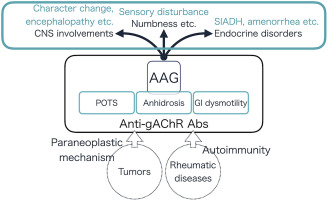Journal of Autoimmunity ( IF 7.9 ) Pub Date : 2020-01-08 , DOI: 10.1016/j.jaut.2020.102403 Shunya Nakane 1 , Akihiro Mukaino 1 , Osamu Higuchi 2 , Maeda Yasuhiro 3 , Koutaro Takamatsu 4 , Makoto Yamakawa 4 , Mari Watari 4 , Nozomu Tawara 4 , Kei-Ichi Nakahara 4 , Atsushi Kawakami 5 , Hidenori Matsuo 6 , Yukio Ando 4

|
The clinical importance of autoantibodies against the ganglionic acetylcholine receptor (gAChR) remains to be fully elucidated. We aimed to identify the clinical characteristics of autoimmune autonomic ganglionopathy (AAG) in patients with gAChR autoantibodies. For this cohort investigation, serum samples were obtained from patients with AAG between 2012 and 2018 in Japan. We measured the levels of autoantibodies against gAChRα3 and gAChRβ4 and evaluated clinical features, as well as assessing the laboratory investigation results among the included patients. A total of 179 patients tested positive for antibodies, including 116 gAChRα3-positive, 13 gAChRβ4-positive, and 50 double antibody-positive patients. Seropositive AAG patients exhibited widespread autonomic dysfunction. Extra-autonomic manifestations including sensory disturbance, central nervous system involvement, endocrine disorders, autoimmune diseases, and tumours were present in 118 patients (83%). We observed significant differences in the frequencies of several autonomic and extra-autonomic symptoms among the three groups. Our 123I-metaiodobenzylguanidine myocardial scintigraphy analysis of the entire cohort revealed that the heart-to-mediastinum ratio had decreased by 80%. The present study is the first to demonstrate that patients with AAG who are seropositive for anti-gAChRβ4 autoantibodies exhibit unique autonomic and extra-autonomic signs. Decreased cardiac uptake occurred in most cases, indicating that 123I- metaiodobenzylguanidine myocardial scintigraphy may be useful for monitoring AAG. Therefore, our findings indicate that gAChRα3 and gAChRβ4 autoantibodies cause functional changes in postganglionic fibres in the autonomic nervous system and extra-autonomic manifestations in seropositive patients with AAG.
中文翻译:

全面分析179例自身免疫性自主神经节病患者的临床特征和实验室特征。
抗神经节乙酰胆碱受体(gAChR)的自身抗体的临床重要性仍有待充分阐明。我们旨在鉴定患有gAChR自身抗体的患者的自身免疫性自主神经节病(AAG)的临床特征。在本次队列研究中,从2012年至2018年之间在日本的AAG患者中获取了血清样本。我们测量了针对gAChRα3和gAChRβ4的自身抗体的水平,评估了临床特征,并评估了纳入患者的实验室研究结果。共有179名患者的抗体测试呈阳性,包括116gAChRα3阳性,13gAChRβ4阳性和50双重抗体阳性患者。血清阳性的AAG患者表现出广泛的自主神经功能障碍。超自主的表现,包括感觉障碍,118名患者(83%)出现中枢神经系统受累,内分泌失调,自身免疫性疾病和肿瘤。我们观察到三组中几种自主神经和自主神经症状的频率有显着差异。我们的整个队列的123 I-甲代异戊苄基胍心肌闪烁显像分析显示,心脏与纵隔之比降低了80%。本研究是第一个证明抗gAChRβ4自身抗体血清阳性的AAG患者表现出独特的自主神经和自主神经体征。在大多数情况下,心脏摄取减少,这表明123 I-碘碘苄基胍心肌闪烁显像可用于监测AAG。因此,我们的发现表明,gAChRα3和gAChRβ4自身抗体会导致AAG血清反应阳性患者的自主神经系统神经节后纤维功能改变和超自主性表现。











































 京公网安备 11010802027423号
京公网安备 11010802027423号